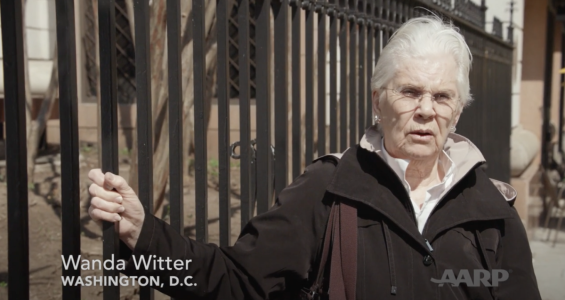This 80-year-old homeless woman fought for 16 years to prove she wasn't insane. You won't believe what happened next!
- Replies 0
In the heart of Washington, D.C., amidst the bustling city life, an 80-year-old woman named Wanda Witter lived a reality far removed from the American Dream.
For 16 long years, Witter, without a roof over her head, clung to a belief that many labeled as a delusion.
She claimed that the Social Security Administration owed her a substantial sum of money. What happened to her?
Witter's journey into the abyss of homelessness began with a job loss. She was a machinist in Corning before moving to Colorado to stay with her daughter.
Seeking a fresh start, she pursued paralegal studies and graduated with new hope. However, when she arrived in Washington, D.C., to find work, her life took an unexpected detour.
The Social Security checks she depended on were erratic and incorrect. Between 2006 and 2008, Witter received inconsistent amounts, which she promptly returned, marked “void,” in a steadfast effort to correct the errors.
As her financial situation deteriorated, she found herself without a home, yet she refused help from her family, convinced that the truth would prevail.

She was repeatedly sent to mental health counselors, her claims dismissed as figments of her imagination.
But Witter's resolve never wavered. She carried three suitcases filled with documents—proof she hoped would one day vindicate her.
The tide turned when social worker Julie Turner chose to believe Witter's story. Turner's intervention led Witter to Legal Counsel for the Elderly, where attorney Daniela de la Piedra verified the legitimacy of her claims.
In June 2016, Witter received a check for $999, the maximum immediate amount issued by Social Security, a first step toward justice.
Despite the initial victory, Witter's struggles were far from over. While awaiting the rest of her payments, she endured an attack by another homeless individual.
But the story that began with hardship is now one of hope. Witter's full payments are being processed, and she has moved into her own apartment, paying $500 a month in rent.
“She needed economic help, not mental help,” Turner remarked, shedding light on the often-misunderstood causes of homelessness.
Witter's story is a powerful reminder of the importance of securing one's financial future. With concerns about the long-term viability of Social Security, it's crucial to explore additional means of retirement income.
Shannon Benton, executive director of the Senior Citizens League, advises starting early with savings and investing in retirement accounts such as 401(k)s or IRAs.
401(k) plans, often matched by employers, and Individual Retirement Accounts (IRAs), which offer tax advantages and investment flexibility, are two key strategies for building a retirement nest egg.
Maximizing contributions to these accounts can provide a much-needed supplement to Social Security benefits.
Source: AARP / Youtube.

Have you or someone you know faced similar challenges with Social Security or other retirement benefits? How are you planning to supplement your income in retirement? Share your experiences and strategies in the comments below!
For 16 long years, Witter, without a roof over her head, clung to a belief that many labeled as a delusion.
She claimed that the Social Security Administration owed her a substantial sum of money. What happened to her?
Witter's journey into the abyss of homelessness began with a job loss. She was a machinist in Corning before moving to Colorado to stay with her daughter.
Seeking a fresh start, she pursued paralegal studies and graduated with new hope. However, when she arrived in Washington, D.C., to find work, her life took an unexpected detour.
The Social Security checks she depended on were erratic and incorrect. Between 2006 and 2008, Witter received inconsistent amounts, which she promptly returned, marked “void,” in a steadfast effort to correct the errors.
As her financial situation deteriorated, she found herself without a home, yet she refused help from her family, convinced that the truth would prevail.

An 80-year-old homeless woman named Wanda Witter received a $100,000 Social Security payment after a 16-year ordeal of proving her eligibility. Image source: AARP / Youtube.
She was repeatedly sent to mental health counselors, her claims dismissed as figments of her imagination.
But Witter's resolve never wavered. She carried three suitcases filled with documents—proof she hoped would one day vindicate her.
The tide turned when social worker Julie Turner chose to believe Witter's story. Turner's intervention led Witter to Legal Counsel for the Elderly, where attorney Daniela de la Piedra verified the legitimacy of her claims.
In June 2016, Witter received a check for $999, the maximum immediate amount issued by Social Security, a first step toward justice.
Despite the initial victory, Witter's struggles were far from over. While awaiting the rest of her payments, she endured an attack by another homeless individual.
But the story that began with hardship is now one of hope. Witter's full payments are being processed, and she has moved into her own apartment, paying $500 a month in rent.
“She needed economic help, not mental help,” Turner remarked, shedding light on the often-misunderstood causes of homelessness.
Witter's story is a powerful reminder of the importance of securing one's financial future. With concerns about the long-term viability of Social Security, it's crucial to explore additional means of retirement income.
Shannon Benton, executive director of the Senior Citizens League, advises starting early with savings and investing in retirement accounts such as 401(k)s or IRAs.
401(k) plans, often matched by employers, and Individual Retirement Accounts (IRAs), which offer tax advantages and investment flexibility, are two key strategies for building a retirement nest egg.
Maximizing contributions to these accounts can provide a much-needed supplement to Social Security benefits.
Source: AARP / Youtube.
Key Takeaways
- An 80-year-old homeless woman named Wanda Witter received a $100,000 Social Security payment after a 16-year ordeal of proving her eligibility.
- After being dismissed as “crazy,” her situation improved when social worker Julie Turner and attorney Daniela de la Piedra took her story seriously and helped her.
- Wanda Witter faced homelessness and mental health misdiagnoses due to incorrect Social Security payments but remained determined to resolve her financial issues.
- Wanda Witter's story exemplifies the difficulties faced by individuals when bureaucratic systems fail and the importance of persistence in overcoming such challenges.
Have you or someone you know faced similar challenges with Social Security or other retirement benefits? How are you planning to supplement your income in retirement? Share your experiences and strategies in the comments below!






